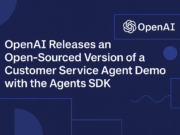In today’s fast-paced world, the field of innovation management is constantly evolving, with new tools and technologies emerging regularly. And artificial intelligence (AI) has become one of the most talked-about, yet mysterious topics in this field. In our latest webinar, we joined industry experts Daniel Käsmayr, Principal Scientist, Community Management & Ideation at BASF, and Lauri Järvilehto, Professor of Practice at Aalto University to explore the details of artificial intelligence in innovation management.
Let’s dive into the most valuable insights from this expert-led session to address the most pressing questions surrounding AI—and learn how to harness this transformative technology to your advantage.
Breaking Down AI’s Role in Innovation Management
Innovation management is no doubt entering a transformative era, where artificial intelligence is redefining traditional approaches. Here’s how.
What’s Exciting About AI?
Artificial intelligence is an endlessly fascinating topic that inspires enthusiasm among professionals like our speakers, Daniel and Lauri. During the webinar, they shared their thoughts on what makes AI so exciting.
One accurate comparison is the pace of AI development and the Industrial Revolution when machines replaced physical strength. Now, we’re moving into a stage where the brain is being disrupted.
“In innovation management, we often talk about new markets and disruption. Now, we’re living through something that’s super disruptive or at least potentially disruptive. It moves exponentially, it’s fast, and you need to keep up with it to figure out what it is,” said Käsmayr.
Additionally, neural networks can generate human-like speech and carry on conversations, which opens new perspectives on language use.
AI’s Impact on Efficiency Gains and Semantic Search
The integration of artificial intelligence into innovation management opens a new chapter of efficiency and semantic search capabilities. With AI tools, innovators can process vast amounts of data with incredible speed and accuracy. From filtering information to conducting brainstorming sessions, AI streamlines processes, allowing for faster innovation and optimization of resources. Despite common misconceptions about its effectiveness for information retrieval, AI-powered language models offer enormous potential for innovation management.
Augmented Intelligence and Human Collaboration
Innovation management relies heavily on collaboration, and artificial intelligence serves as a catalyst for augmented intelligence.
“Instead of artificial intelligence, we should talk about augmented intelligence. You don’t have any output from these systems without human input. The collaboration between humans and the beautiful mathematical linguistic architecture is what leads us to new thinking,” said Järvilehto.
Instead of replacing humans, AI complements human thinking and innovation processes through linguistic architecture and idea coaching. The accuracy of AI results depends on the quality of the prompts, which underscores the importance of using good prompts to increase accuracy and productivity in idea-generation tasks. Large organizations are increasingly recognizing the importance of AI in managing innovation, making efforts to use chat interfaces and automated tools to optimize processes and improve user experience.
Navigating Challenges in AI Adoption
While the integration of artificial intelligence (AI) into innovation management holds immense promise, there are certain considerations that should be kept in mind to ensure its effective application.
Struggles with Accuracy and Speed
While artificial intelligence can help generate ideas, improve brainstorming, and save time and money, there is an ongoing need to address issues related to its accuracy and efficiency. This requires continuous improvement and optimization of AI algorithms to improve performance and eliminate inefficiencies. Double-checking the information provided by AI is crucial as well.
Biases and Ethical Considerations
Another important aspect of applying AI in innovation management concerns training data bias and ethical considerations. Our speakers emphasized the importance of eliminating bias in AI models to ensure fair results. Needless to say, an ethical framework guiding AI implementation is necessary to address these challenges.
Understanding Social Impact and Appropriate Use
As artificial intelligence technology is rapidly evolving, it is necessary to understand its potential social impact and educate users on its proper use. Although AI promises productivity gains, we need to be careful to prevent a decline in the quality of daily tasks. Informing employees about the social implications of AI and constantly coaching them is crucial for responsible AI adoption.
.png?width=640&height=366&name=Copy%20of%20ISO%2027001%20thumbnail(1).png)
Concluding Thoughts
Despite challenges, artificial intelligence remains a powerful tool for innovation management, enabling organizations to improve efficiency and productivity. By using AI, innovators can move beyond conventional thinking and access new and unusual ideas, enabling innovators to discover new ways to grow and foster a culture of innovation.
However, it’s important to stay vigilant and proactive while harnessing the transformative potential of AI to drive innovation and growth. By staying up to date with emerging trends, promoting the ethical use of AI, and educating employees on AI capabilities, organizations can set the course for success in this ever-changing world.



















![Diablo 4 Mod Apk Newest Model [Unlimited Excitement]](https://digibytetoday.com/wp-content/uploads/2025/06/1750344127_1-final-180x135.jpg)
















